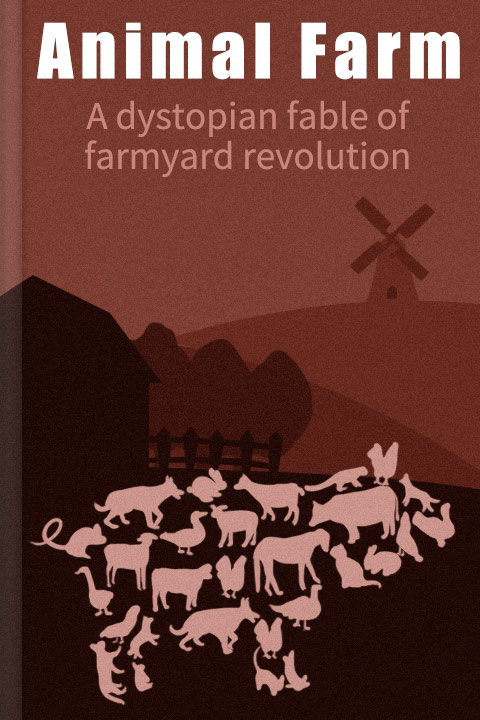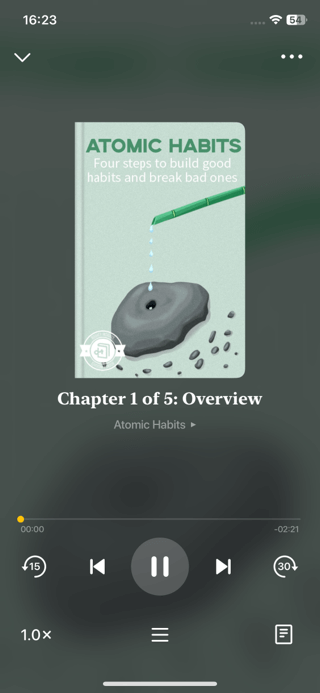Last updated on 2025/04/30
Animal Farm Summary
George Orwell
A Tale of Power and Corruption in Revolution
Last updated on 2025/04/30
Animal Farm Summary
George Orwell
A Tale of Power and Corruption in Revolution
Description

How many pages in Animal Farm?
128 pages
What is the release date for Animal Farm?
In George Orwell's poignant allegory "Animal Farm," a group of overworked farm animals rises in revolt against their oppressive human farmer, only to find that the struggle for equality and freedom can blur the lines between liberators and oppressors. This gripping tale serves as a powerful commentary on the nature of power and the ease with which ideals can be corrupted, as the animals grapple with their new governance under the shrewd pig Napoleon. Through its vivid characters and stark narrative, Orwell invites readers to reflect on the complexities of leadership, the fragility of democracy, and the perils of blindly following authority, making "Animal Farm" not only a remarkable piece of literature but also a timeless warning about the cycles of tyranny that can arise in any society.
Author George Orwell
George Orwell, born Eric Arthur Blair in 1903, was a British writer, journalist, and social critic renowned for his keen insights into totalitarianism and the plight of the working class. His experiences in the Spanish Civil War and his disillusionment with authoritarian regimes deeply influenced his literary works, infusing them with a sense of urgency and moral clarity. Orwell's best-known works, including "1984" and "Animal Farm," are characterized by their allegorical and dystopian themes, where he masterfully critiques oppressive governments and explores the complexities of social inequality. His commitment to truth, freedom, and justice continues to resonate with readers worldwide, solidifying his legacy as one of the most significant voices of the 20th century.
Animal Farm Summary |Free PDF Download
Animal Farm
Chapter 1 |
In the opening chapter of "Animal Farm," we are introduced to Mr. Jones, the negligent and drunken owner of Manor Farm, who clumsily goes to bed, leaving the animal dwellings unlocked. This sets the stage for a pivotal meeting called by Old Major, a revered boar, who has had a prophetic dream he wishes to share with the other animals. As night falls, the animals gather in the barn, with various species—dogs, pigs, horses, and hens—settling in to hear Major’s message. Old Major, an aged and wise pig, addresses his comrades, conveying a stark reflection on their lives. He draws attention to their miserable existence, oppressed by humans who exploit their labor and live lavishly off their toil. According to Major, the animals labor diligently only to be rewarded with deprivation, their lives cut short at the hands of their human masters. He identifies Man as the root of all their suffering, claiming that if they can overthrow humanity, they could live prosperous lives free of oppression. Major's passionate call to action is for rebellion against humans, emphasizing that all animals must unite against their common enemy. He stresses the importance of maintaining their principles during the fight, warning against adopting the corrupt behaviors of humans. He instills a sense of camaraderie among the animals, declaring that all creatures on four legs or with wings are friends, while those on two legs are enemies. Towards the end of the meeting, Old Major introduces a stirring song from his youth, "Beasts of England," which embodies their hopes for a future free from human tyranny. The excitement is palpable as the animals join in song, forgetting their troubles and boosting their spirits. However, their joyful gathering is abruptly interrupted when Mr. Jones, alerted by the commotion, fires his gun into the barn, causing chaos as the animals scatter back to their quarters. Through this chapter, key themes of oppression, unity, and the yearning for freedom are established, laying a profound foundation for the events to unfold in the story. The characters, particularly Old Major, are introduced with depth, showcasing their struggles and aspirations. This opening sets the tone for the rebellion that soon follows, igniting hope for a brighter future among the animals.
Chapter 2 |
Three nights after Old Major's inspiring speech about rebellion against their human oppressors, he passed away peacefully in his sleep. His death sparked a wave of secret activities among the more intelligent animals on the farm, mainly the pigs, who began preparing for the rebellion Major had envisioned. Leading the pigs were Snowball and Napoleon. Snowball was enthusiastic and inventive, while Napoleon was more fierce and cunning. Together with Squealer, a smooth-talking pig who could manipulate words to his advantage, they formulated the ideology of Animalism, based on Major's teachings. The pigs organized secret meetings to educate the other animals about Animalism, but initially faced resistance and apathy. Some animals expressed loyalty to their human owner, Mr. Jones, and questioned why they should care about a future rebellion. Mollie, the vain mare, was particularly concerned about losing her ribbons, symbolizing her attachment to human comforts. Meanwhile, Moses, Mr. Jones’s pet raven, spread tales of a mythical place called Sugarcandy Mountain, causing further distraction among the animals. Despite the challenges, two horses, Boxer and Clover, became devoted followers of the pigs, embodying the hardworking spirit of the farm. As the summer progressed, Mr. Jones’s neglect and alcoholism worsened, leading to a critical moment when he fell asleep after a drinking spree, leaving the animals unfed. In a spontaneous act of rebellion, the animals, driven by hunger and anger, charged at Jones and his men, forcing them to flee the farm. With the humans gone, the animals celebrated their newfound freedom. They joyfully destroyed remnants of Jones's oppressive rule, including whips and harnesses, and declared Animal Farm theirs. In a euphoric state, they explored the farm and eventually ventured into the farmhouse but pledged not to live there, deciding to preserve it as a museum. The next day, Snowball and Napoleon shared their plan to rename Manor Farm to Animal Farm and unveiled the Seven Commandments of Animalism to guide their new society. They painted the commandments on the barn wall, emphasizing equality among the animals and their shared goals against human oppression. However, just as they were about to begin the hay harvest, the pigs decided to keep the milk for themselves, setting a precedent that hinted at the power dynamics that would begin to shift as they claimed leadership. Overall, this chapter captures the excitement of the animals' rebellion, their struggle for understanding and unity, and the early signs of inequality that would arise among them, setting the stage for the complexities of their new society.
Key Point: The importance of unity and collective action in the face of oppression
Critical Interpretation: Imagine standing together with others to fight against the injustices in your life; just like the animals on the farm who united under the teachings of Old Major, you too can draw inspiration from the power of collective action. Their rebellion was sparked not just by hunger, but by a shared dream of a better future, illuminating how your strength lies in solidarity. By recognizing that together, you can confront challenges and inequalities more effectively than alone, you can empower yourself and others to bring about meaningful change in your community.
Chapter 3 |
In Chapter 3 of "Animal Farm," the animals work tirelessly to harvest the hay, achieving an unprecedented success under their collective effort, as they finish in record time with no waste. The pigs, as the smartest members of the group, take on leadership roles to oversee the others; Boxer and Clover lead by example, working harder than anyone else. Boxer, in particular, adopts the motto “I will work harder!” and seems to shoulder the burden of the farm's labor by himself. The atmosphere is far more positive than it was under Mr. Jones; the animals are pleased, experiencing a sense of ownership over their food and their lives. Despite the hard work, the animals experience joy and camaraderie, with no signs of theft or discontent—except for occasional laziness from Mollie and the mysterious disappearances of the cat. Meanwhile, Benjamin remains skeptical and refuses to express any happiness about the new regime. Sunday becomes a day of rest, during which the flag representing Animalism is raised, and meetings are held to discuss the farm's future. The pigs dominate these meetings, and while they engage in spirited debates, it becomes clear that Snowball and Napoleon often disagree on policies and ideas, hinting at future conflicts. In an effort to improve life on the farm, Snowball establishes various committees to enhance productivity and education, although most of these initiatives ultimately fail. On the other hand, literacy among the animals progresses, with the pigs becoming particularly adept at reading and writing. Snowball simplifies the Seven Commandments into the catchphrase "Four legs good, two legs bad" to make it easier for the other animals to remember. Napoleon, however, shows little interest in Snowball's educational efforts, prioritizing the upbringing of puppies under his care in secret, distancing them from the other animals. As the fall approaches, the pigs begin taking special advantages for their health, claiming milk and apples are necessary for their superior mental work. Squealer is dispatched to persuade the other animals that this arrangement is for everyone's benefit, using the threat of Mr. Jones's return to quell any dissent. The animals concede, unable to refute the pigs' logic and fearful of losing their hard-won independence. Overall, this chapter highlights the strong work ethic of the animals, the burgeoning division between the leadership of the pigs and the rest, and underscores themes of manipulation, inequality, and the struggle for power. The initial optimism begins to show cracks as the pigs start to claim privileges, setting the stage for the unfolding drama of betrayal and ideology on the farm.
Key Point: Collective effort leads to success
Critical Interpretation: Imagine a community where everyone contributes their strengths, just like the animals in Animal Farm united to achieve an extraordinary harvest. Their diligent work not only improved their circumstances but fostered a genuine sense of pride and ownership in their achievements. This chapter reminds us that when we come together, pooling our skills and energies, we can accomplish what seems impossible. Whether in the workplace, school, or local initiatives, embracing teamwork can enhance our outcomes, cultivate camaraderie, and create a shared purpose. It inspires us to value collaboration and recognize that, with unity, we can elevate each other towards greater heights.
Chapter 4 |
As summer turned to autumn, rumors of Animal Farm’s rebellion spread across the countryside, thanks in part to Snowball and Napoleon’s efforts. They sent out pigeons to inspire animals on neighboring farms with stories of their newfound freedom and the stirring song "Beasts of England." Meanwhile, Mr. Jones, the former farmer, fumed in local pubs, lamenting the injustice he faced from the animals. Other farmers, Mr. Pilkington of Foxwood and Mr. Frederick of Pinchfield, both fearful of a similar rebellion, dismissed the farm’s success as a fluke while secretly plotting their own advantage. As the rebellion's influence grew, disillusioned animals began to exhibit signs of restlessness and defiance, but stories of Animal Farm morphed into darker rumors spun by the humans to maintain control. Despite attempts to downplay the situation, the song "Beasts of England" inspired hope and fear, spreading among the rural wildlife like wildfire. Humans tried to suppress the tune, fearing it heralded their own doom, yet it only intensified their rage. The moment came in October when Mr. Jones, now emboldened with hired help, attempted to recapture Animal Farm. The animals, led by Snowball who had studied military strategy, were prepared for battle. Initially using creative tactics like aerial dung attacks by pigeons and surprise ambushes from the cows and horses, they engaged the men in a fierce confrontation. Amid the chaos, Snowball was injured, and Boxer, the strong yet gentle horse, unintentionally killed a boy with his iron-shod hoofs—an act that filled him with sorrow. As the battle progressed, the humans, overwhelmed and panicked, found themselves in disarray, ultimately fleeing the farm in defeat. After the skirmish, the animals mourned their fallen comrade, a sheep, and celebrated their victory with an impromptu ceremony, singing "Beasts of England" fervently. They honored their brave fighters, Snowball and Boxer, declaring them "Animal Heroes." The battle was named the "Battle of the Cowshed" and marked a significant moment in the farm's history, leading to plans for a commemorative cannon salute. Chapter 4 in "Animal Farm" vividly illustrates themes of rebellion, camaraderie among the oppressed, and the militarization of the animals in their quest for independence, while also foreshadowing the complexities and moral dilemmas that come with such struggles. The excitement of victory is contrasted with the gravity of the costs of rebellion, particularly underscored by Boxer’s profound remorse for violence, revealing the ongoing tension between the ideals of the revolution and the harsh realities of conflict.
Key Point: The power of collective action and hope in the face of oppression
Critical Interpretation: Imagine standing shoulder to shoulder with those who share your dreams, united by a common cause. Just like the animals in Animal Farm, who banded together to fight for their freedom, you too can draw inspiration from their collective courage. When challenges seem insurmountable, remind yourself that hope is a powerful catalyst for change. The song 'Beasts of England' sparked inspiration and solidarity among them, showing that together, even the smallest voices can create a symphony loud enough to challenge the status quo. Embrace the spirit of resilience and community in your own life, knowing that while struggles may arise, the power of togetherness can lead to remarkable victories.
Chapter 5 |
As the harsh winter settled in, Mollie, the vain mare, grew increasingly unmanageable, constantly arriving late to work with flimsy excuses and often sneaking off to a nearby drinking pool to admire her own reflection. Clover, her friend, confronted her about being seen conversing with a human, but Mollie denied it vehemently, eventually fleeing the conversation and hinting at her desire to return to a more luxurious life. Soon, she vanished entirely, later spotted indulging in treats and receiving affection from a man on the other side of the farm—the fate of those who favored human comforts over their fellow animals. With winter pressing down, the animals convened in the barn to strategize for spring planting, led by the pigs who had become the self-appointed decision-makers. However, conflict erupted between two prominent pigs, Snowball and Napoleon, whose opposing visions created tension on the farm. Snowball, full of innovative ideas, proposed building a windmill to generate electricity and ease their labor, while Napoleon dismissed the idea without offering alternatives, biding his time with cunning. During a critical meeting, Snowball passionately presented his windmill plan, which promised a future of leisure and ease. But just as he garnered support, Napoleon unleashed his pack of fierce dogs, chasing Snowball away and solidifying his control over the farm. The remaining animals, confused and frightened, were left to grapple with the abrupt end of their Sunday meetings, now replaced by private decisions made by Napoleon and a select group of pigs. Through Squealer, Napoleon justified this shift as a necessary sacrifice for leadership. He painted dissenters as potential threats, using Snowball’s supposed treachery as a tool to eliminate opposition and instill fear. Unwilling to risk the return of Mr. Jones, the former tyrant, the animals reluctantly accepted Napoleon’s new order, with Boxer, the loyal draft horse, adopting the mantra, “Napoleon is always right.” As the seasons changed and spring approached, the animals found themselves returning to the barn weekly for orders, where they now filed past Old Major’s skull for reverence. Surprisingly, Napoleon announced that the windmill would be built after all, a reversal of earlier stances that left some animals puzzled. Squealer spun a tale suggesting that Napoleon had secretly supported the windmill all along and that Snowball had merely stolen the plan from him. This deft manipulation of truth kept the animals compliant, even if they didn't fully grasp the intricacies of what Squealer called "tactics." Thus, a facade of democracy faded, with the animals unknowingly sliding deeper into the grip of tyranny as they were led to believe they had a future worth working for, despite the mounting evidence to the contrary.
Chapter 6 |
In Chapter 6 of "Animal Farm," the animals endure a grueling year of hard work, pouring their efforts into building the windmill and improving their farm. Despite the long hours—now even extending to Sundays—there's a sense of camaraderie among the animals as they labor for their own benefit, not for humans. However, they face difficulties, such as a less successful harvest and challenges with the construction of the windmill, which requires them to creatively solve problems without the tools humans would typically use. Boxer, the hardworking horse, emerges as a symbol of dedication and strength, often pushing himself to the limit with his mottos, “I will work harder” and “Napoleon is always right.” Despite the exhaustion, the animals are somewhat satisfied, as they are not worse off than during Mr. Jones's time, although they start experiencing shortages of essential supplies. In a surprising turn of events, Napoleon announces plans to engage in trade with nearby farms to procure necessary materials for the windmill, contradicting the initial principles of their rebellion. This decision makes the animals uneasy, as they recall vows against engaging with humans. With Squealer's persuasive rhetoric, they are convinced that there was never a resolution against trade, thus keeping their morale somewhat intact. As the pigs begin to enjoy luxuries, such as moving into the farmhouse, Squealer reassures the animals that such changes are justified due to the pigs' hard work and need for a suitable environment. Discontent is managed through manipulation of the commandments, allowing the pigs to sleep in beds (now permitted without sheets, according to Squealer) and wake later than the other animals. The chapter culminates in disaster when a fierce windstorm destroys the windmill they have worked so hard to build. In the aftermath, Napoleon pivots blame onto Snowball, branding him a traitor responsible for the destruction. The animals, shocked by this accusation, rally to capture Snowball, unaware that Napoleon's manipulation is merely to distract them from the real challenges they face. The resolve to rebuild the windmill is reignited, emphasizing themes of loyalty, manipulation, and the resilience of the working class under oppressive leadership.
Key Point: Dedication and Resilience despite Adversity
Critical Interpretation: Imagine waking up each day to the weight of your responsibilities pressing down on you, yet finding strength in the shared hope of a better tomorrow. Like the animals in Chapter 6 of 'Animal Farm,' who tirelessly worked to build their windmill despite exhausting hours and setbacks, you too can draw inspiration from their unwavering dedication. Life will inevitably throw challenges your way, and it may often feel easier to succumb to exhaustion or give up. However, embracing the spirit of camaraderie and resilience, recognizing that your efforts contribute to a greater cause, can ignite a fire within you to persevere. Every moment you choose to work harder, to support your community, and to rise above the difficulties, you forge not just a path to personal growth but strengthen the bonds of those around you, setting the foundation for a brighter future.
Chapter 7 |
In Chapter 7 of "Animal Farm," a harsh winter brings hardship to the animals as they strive to rebuild the windmill. With food supplies dwindling and their bodies suffering from cold and hunger, the animals work tirelessly, inspired mainly by Boxer, who continues to chant, "I will work harder!" Despite Squealer’s optimistic speeches about the dignity of labor, morale is low. Food shortages grow dire when it’s discovered that much of the potato crop has spoiled. To shield the truth from the outside world, Napoleon uses Mr. Whymper to spread false reports that food rations have increased, while hiding the actual situation. As the food crisis deepens, Napoleon demands the hens surrender their eggs to trade for grain. Some hens rebel, spurred by their anger and desperation, but Napoleon’s retaliation is brutal; nine hens die during the conflict, with their deaths covered up as illnesses. Meanwhile, Snowball, who had been expelled, is rumored to be plotting against them, and Napoleon exploits these fears, claiming Snowball is secretly sabotaging the farm. The chapter takes a dark turn when Napoleon stages a public spectacle to root out supposed traitors. Pigs confess to collaborating with Snowball, leading to their execution by the dogs. This shocking display of violence terrifies the other animals, who grapple with the horrifying realization that their comrades are now their executioners. Boxer, still loyal and confused about the betrayal, believes the solution is to work harder. The once hopeful atmosphere of Animal Farm is stifled by fear. The remaining animals are disheartened as they realize their situation has grown worse than under the humans. They start to question the purpose of their rebellion as their lives are now marked by oppression and bloodshed. As a nod to their past, Clover sings "Beasts of England," a song that carried hope for a better future. However, Squealer soon announces its ban, declaring that the revolution is complete and that their current state is all they aimed for—a stark contrast to the original vision of equality and freedom. Instead, a new song composed by a pig takes its place, but it fails to inspire the same hope and longing among the animals. The chapter closes on a somber note, highlighting the tragic betrayal of their ideals and the deepening descent into tyranny.
Chapter 8 |
In Chapter 8 of "Animal Farm," the aftermath of the brutal executions lingers over the farm. As the animals grapple with the chilling memory of their comrades' deaths, some begin to question the foundation of their beliefs, particularly the Sixth Commandment, which they recall as "No animal shall kill any other animal." Clover's inquiry highlights that the Commandment now includes "without cause," a reminder of how their memories have been manipulated by the pigs. The animals work tirelessly to rebuild the windmill to greater specifications. This grueling effort mirrors their experiences under Mr. Jones, with Squealer tirelessly proclaiming impressive production figures, convincing them they are better off even though many feel the strain of hard labor and meager rations. As Napoleon becomes increasingly removed from the everyday life of the farm, he adopts grand titles and puts on a show of leadership, complete with ceremonies and sycophantic praise from Squealer, who enshrines him in extravagant poetry. The tension between Animal Farm and the neighboring farms grows, especially as rumors circulate about Snowball's alleged treachery. This culminates in more confessions and executions, instilling fear among the beasts, while Napoleon fortifies himself with increased security. Meanwhile, Napoleon engages in negotiations with Frederick and Pilkington regarding some timber, although he's secretly leaning toward Frederick, all while deflecting concern about Snowball's influence. As summer progresses, the animals' success culminates with the completion of the new windmill, a feat they celebrate despite their exhaustion. However, Napoleon reveals he has sold the timber to Frederick, shocking the animals. Soon, they learn that Frederick has duped them with counterfeit money, sparking outrage and trepidation about an imminent attack. When Frederick and his men invade, the animals put up a brave fight but are ultimately outmatched and suffer grievous injuries. After they witness the destruction of the windmill, their resolve hardens, and they attack back fiercely, driving Frederick’s men away, but at a heavy cost. This battle is dubbed the Battle of the Windmill, and while they feel a hollow sense of victory, Squealer spins the narrative to paint their losses as heroic accomplishments. Back at the farm, after a bout of drunken revelry, Napoleon feigns illness, and Squealer announces a new decree against alcohol, illustrating the hypocrisy of the pigs' actions. As tensions rise, the animals discover that the commandments are subtly altered to justify the pigs' indulgences and consolidate their power. The chapter closes with a sense of confusion and betrayal as the animals come to realize their rights and liberties are continually eroded, showing how easily tyranny can mask itself under the guise of leadership for the greater good.
Key Point: The manipulation of truth can lead to the erosion of rights and justice.
Critical Interpretation: In your life, the key lesson from Chapter 8 of 'Animal Farm' serves as a stark reminder to critically evaluate the information presented to you. Just as the animals on the farm gradually accepted the altered commandments and the distortion of their reality, you too may find yourself enveloped in narratives that shift to benefit those in power. This chapter inspires you to remain vigilant against manipulation, fostering a commitment to transparency and truthfulness, empowering you to safeguard your rights and the rights of others in the face of authority.
Chapter 9 |
In Chapter 9 of "Animal Farm," life grows increasingly harsh for the animals as they work tirelessly to rebuild the windmill, with Boxer leading the charge despite the pain from his injured hoof. Boxer’s unwavering dedication, fueled by the hope of retirement and seeing the windmill finished, highlights his noble character and relentless work ethic. Clover, ever the concerned friend, tries to care for him, while Benjamin, the skeptical donkey, warns him to take care of his health. The harsh winter brings food shortages, yet Squealer, the pig, spins tales of well-being, convincing the animals that their lives are better than under Mr. Jones, even as rations continue to dwindle for all but the pigs. Within this environment, the pigs entrench their power further, establishing privileges for themselves and reinforcing their status. The birth of new piglets leads to the establishment of a school for pigs, further solidifying the educational divide. The contrast between the pigs' growing comfort and the other animals' suffering becomes starkly apparent. Marching under the banner of a Republic, Napoleon is elected as the sole candidate and continues to vilify Snowball, painting him as a traitor who sided with humans during battles. Meanwhile, the return of Moses, the raven, heralds discussions about a paradisiacal afterlife, “Sugarcandy Mountain,” providing some animals with fleeting comfort amidst their struggles. As the summer progresses, Boxer’s health deteriorates despite his hard work. When he collapses from exhaustion, Clover calls for help, and Squealer arrives, feigning concern. Boxer is promised treatment in Willingdon, but a tragic twist unfolds when Benjamin discovers that the van taking Boxer away is owned by a horse slaughterer. Despite their desperate cries, the van speeds away, sealing Boxer’s fate and exposing the harsh reality of betrayal masked by propaganda. In the aftermath, Squealer manipulates the narrative of Boxer’s supposed death, claiming he passed peacefully, ensuring the animals remain loyal to Napoleon. The chapter closes with the pigs indulging in whisky, a stark reminder of their corruption, contrasting sharply with Boxer’s sacrifice. This chapter presents themes of exploitation, betrayal, and the manipulation of truth, showing how the ideals of the rebellion have eroded as the pigs solidify their power at the expense of their fellow animals.
Chapter 10 |
In the closing chapter of "Animal Farm," time has passed, and the farm has evolved, though not in the way the original revolutionaries envisioned. Most of the animals that participated in the Rebellion are now gone, with only a few, including Clover, Benjamin, and the dwindling number of pigs, recalling the past. The farm appears to be thriving—the windmill is completed, new buildings have been added, and they even purchased fields from Mr. Pilkington. However, the animals' lives have not improved; they remain overworked, underfed, and unaware of their exploitation, believing Squealer's claims of progress. Clover, now old and achy, notices changes on the farm, particularly in the pigs, who grow ever more privileged and distanced from the rest. As the pigs begin walking on their hind legs and adopting human traits—their behavior further fueled by Squealer’s manipulation—Clover's concern crescendos when she and Benjamin discover that the Seven Commandments have been replaced by one: "All animals are equal, but some animals are more equal than others." One day, Squealer leads the sheep away for a week to teach them a new song, a tactic intended to distract the other animals. When the sheep return bleating the new slogan, the animals find it challenging to voice their protest against the shocking sight of pigs walking upright and wielding whips. Soon after, Napoleon invites human farmers for an inspection, solidifying the alliance and equality he claims to have achieved between animals and humans. During the gathering, Mr. Pilkington praises the farm, oblivious to the suffering of the animals who work tirelessly. The atmosphere turns celebratory as Napoleon toasts to the prosperity of what has now been renamed "The Manor Farm," cementing the return to human-like hierarchy. The animals watch through the window, their hopes crushed as they see pigs and humans indulge in camaraderie—no longer distinguishable from one another. In the final twist, a quarrel erupts when Napoleon and Mr. Pilkington simultaneously play the same winning card—the ace of spades. As chaos ensues inside, the animals peer in, realizing the complete betrayal of their revolution. Ultimately, they find themselves unable to differentiate between pigs and men, symbolizing the complete loss of the original ideals of freedom, equality, and the promise of the Rebellion. This poignant ending reflects the eerie reality that, despite the aspiration for a just society, power corrupts, and the oppressed can easily become the oppressors.










